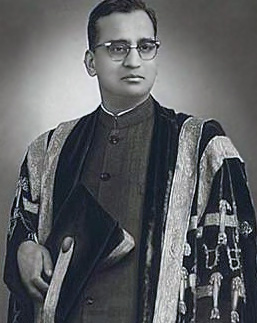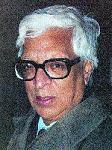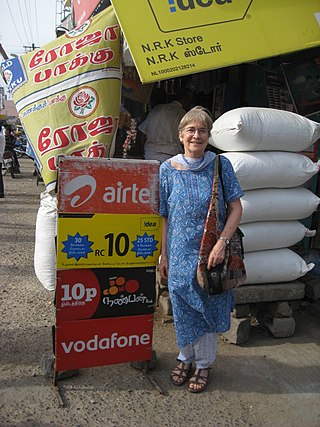Related Research Articles

Verghese Kurien, known as the "Father of the White Revolution" in India, was a social entrepreneur whose "billion-litre idea", Operation Flood, made dairy farming India's largest self-sustaining industry and the largest rural employment sector providing a third of all rural income. It made India the world's largest milk producer, doubled the milk available for each person, and increased milk output four-fold in 30 years.

The University of Madras is a public state university in Chennai, Tamil Nadu, India. Established in 1857, it is one of the oldest and among the most prominent universities in India, incorporated by an act of the Legislative Council of India under the British government.


Vijayendra Kasturi Ranga Varadaraja Rao was an Indian economist, politician and educator.

John Matthai CIE (1886–1959) was an economist who served as India's first Railway Minister and subsequently as India's Finance Minister, taking office shortly after the presentation of India's first Budget, in 1948. He was born on January 10, 1886, as the son of Challiyal Thomas Matthai and Anna Thayyil to an Anglican Syrian Christian family. He graduated in economics from the University of Madras. He served as a Professor and Head in University of Madras from 1922 to 1925. He presented two Budgets as India's Finance Minister, but resigned following the 1950 Budget in protest against the increasing power of the Planning Commission and P. C. Mahalanobis. He was the first Chairman of the State Bank of India when it was set up in 1955. He was the founding President of the Governing Body of the National Council of Applied Economic Research (NCAER) in New Delhi, India's first independent economic policy institute established in 1956. He served as the Vice Chancellor of the University of Mumbai from 1955 till 1957 and then as the first Vice Chancellor of the University of Kerala from 1957 to 1959. His nephew, Verghese Kurien, is generally recognized as the architect of India's White Revolution. Dr. John Matthai Centre, Thrissur, located on the large plot of land donated by his family, is named in his honour. His wife, Achamma Matthai was an Indian social worker and a women's rights activist. The Government of India honoured him in 1954 with the award of Padma Shri, the fourth highest Indian civilian award, for his contributions to the society,

Sarvepalli Gopal was a well-known Indian historian. He was the son of Sarvepalli Radhakrishnan, the first Vice-President and the second President of India. He was the author of the Radhakrishnan: A Biography and Jawaharlal Nehru: A Biography.
Amiya Kumar Bagchi is an Indian political economist.

J. C. Kumarappa was an Indian economist and a close associate of Mahatma Gandhi. A pioneer of rural economic development theories, Kumarappa is credited for developing economic theories based on Gandhism – a school of economic thought he coined "Gandhian economics."

Malcolm Sathiyanathan Adiseshiah, was an Indian development economist and educator. In 1976 he was awarded the Padma Bhushan, India's third-highest civilian award. In 1998, UNESCO created the Malcolm Adiseshiah International Literacy Prize in recognition of his contribution to education and literacy. He was nominated to the Rajya Sabha, the upper house of the Parliament of India, in 1978.
The Madras Institute of Development Studies (MIDS) is a research institute based in Chennai. It is a joint undertaking of the Governments of India and Tamil Nadu for conducting research on development problems in Tamil Nadu and the rest of India.
The Bangalore Initiative for Religious Dialogue (BIRD) is an organisation based in Bangalore, India that promotes dialog between people of different faiths, attempting to defuse tensions between religious communities such as Hindus, Christians and Muslims.
Paul David Devanandan (1901–1962), spelt also as P.D. Devanandan or Paul D. Devanandan, was an Indian Protestant theologian, ecumenist, and one of the notable pioneers in inter-religious dialogues in India.

The Institute of Economic Growth (IEG) is an autonomous, multidisciplinary Centre for advanced research and training. Established in 1958, its faculty of about 23 social scientists and a large body of supporting research staff focus on areas of social and policy concern.
Pulapre Balakrishnan is an Indian economist and educationalist. He has served as the director of Centre for Development Studies and Professor at Indian Institute of Management Kozhikode. Pulapre Balakrishnan was born in his ancestral village of Klari, Malappuram, Kerala in 1955. He was educated in Moscow, Madras and New Delhi, and trained as an economist at Oxford and Cambridge Universities.

Munirathna Anandakrishnan was an Indian civil engineer, educationist, a chairman of the Indian Institute of Technology, Kanpur and a Vice-Chancellor of Anna University. He was also an Advisor to the Government of Tamil Nadu on Information Technology and e-Governance. A winner of the National Order of Scientific Merit (Brazil), he was honored by the Government of India, in 2002, with Padma Shri, the fourth highest Indian civilian award.
Mathias Samuel Soundra Pandian was an eminent social scientist whose area of research covered the Dravidian Movement, South Indian politics, cinema, caste, identity and several other socially relevant issues. Pandian joined the Jawaharlal Nehru University (JNU), Delhi as a professor in 2009. At the time of his death, he was serving in the School of Social Sciences’ Centre for Historical Studies where he offered courses on ‘Region, Language and the Politics of Nation Making’ and ‘Caste, Culture and Communication: An Alternative Intellectual History of Modern India’.

V. R. Panchamukhi, is an Indian Economist and Sanskrit scholar. He was born on September 17, 1936, in Dharwad, Karnataka. He is the eldest son of Vidyaratna Shri R. S. Panchamukhi, an archaeologist and indologist and Sanskrit Scholar.

Barbara Harriss-White is an English economist and emeritus professor of development studies. She was trained in geography, agricultural science, agricultural economics and self-taught in development economics. In the 1990s, she helped to create the multi- and inter- disciplinary thematic discipline of development studies in Oxford Department of International Development; and in 2005-7 founded Oxford's Contemporary South Asia Programme. She has developed an approach to the understanding of Indian rural development and its informal economy, grounded in political economy and decades of what the economic anthropologist Polly Hill called ‘field economics’.
Amita Baviskar is a sociologist and Professor of Environmental Studies and Sociology & Anthropology at Ashoka University, India. Previously, she was Professor at the Sociology Unit, Institute of Economic Growth, Delhi, India. She received the 2005 Malcolm Adiseshiah Award for Distinguished Contributions to Development Studies, the 2008 VKRV Rao Prize for Social Science Research and, in 2010, was awarded the Infosys Prize for Social Sciences – Sociology in recognition of her analysis of social and environmental movements in modern India. Baviskar studies the cultural politics of environment and development in rural and urban India.
Malayil Abraham Oommen is an economist and academic from Kerala, India. He wrote several books and published many articles on issues such as democracy, development, decentralization and economy of Kerala and India. He worked as economic adviser to the Botswana government.
References
- 1 2 NARENDAR PANI (March 26, 2012). "Conceiving an alternative future". The Hindu . Retrieved 2012-04-13.
- 1 2 "Dr. C. T. Kurien". Malcolm and Elizabeth Adiseshiah Trust. Retrieved 2012-04-13.
- ↑ "Arun Shourie to deliver Stanley Samartha memorial lecture". Asia Pacific Ecumenicaql News. September 2009. Archived from the original on 2013-01-12. Retrieved 2012-04-13.
- ↑ "The Institute". Institute for Social and Economic Change. Retrieved 2012-04-13.